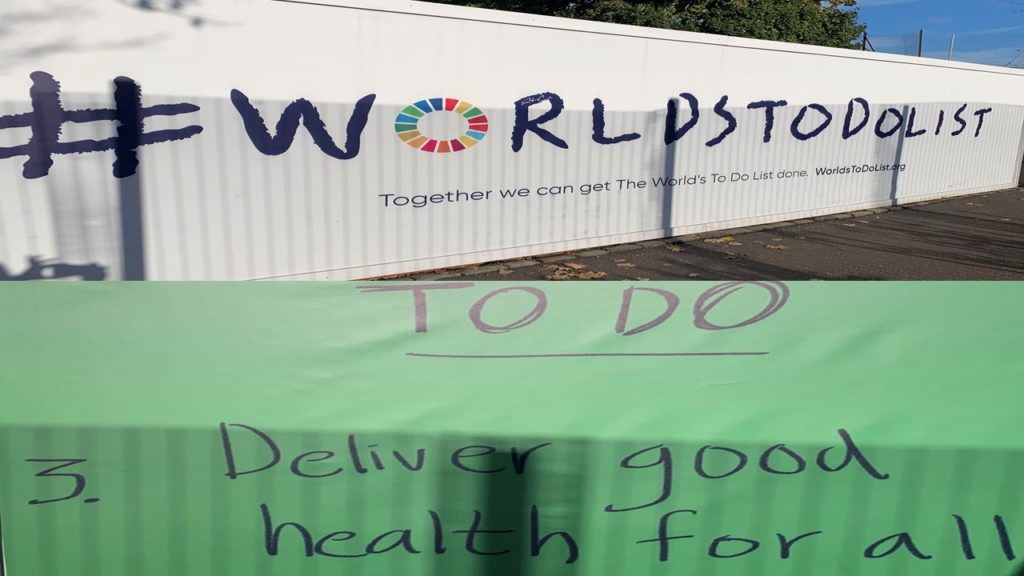We Cannot Talk About Climate Change Without Talking About Health!

By Adrienne L. Hollis, PhD, JD — Chisholm Legacy Project Advisory Committee
Today, I am attending the 2021 Global Conference on Health and Climate Change, with special focus on Climate Justice and the Healthy and Green Recovery from COVID-19. It is organized by the World Health Organization (WHO) and the Global Climate and Health Alliance (GCHA), in close collaboration with the Glasgow Caledonian University and its Centre for Climate Justice, the UK Health Alliance on Climate Change, the Centre on Climate Change and Planetary Health of the London School of Hygiene and Tropical Medicine, and the Wellcome Trust. The conference is being held at the Glasgow Caledonian University and online, due to the number of participants and COVID-19 restrictions. I am attending online.
I admit that I have been searching all week for ‘outside’ events focused on the intersection of climate and health, especially after noting the topic areas of the UNFCCC, which do not seem to include these topics. There have been a few sessions “behind the gates” as I call the official gated COP26 area, where none but those documented people (and not all of them) are allowed entry onto the hallowed grounds. But that is a topic for another blog.
As I listened to the conference speakers, I was struck almost speechless by the fact that, for the first time in the history of the COP, a Health Pavillion is a recognized part of the COP! I do not understand why this is only happening now. How can you possibly talk about climate change without talking about health? About health disparities? For example, a couple of years ago, the summer weather presented us with plenty of examples of how disruptive extreme heat events could be. A massive heat wave across the US and in Europe, which people experienced several times, showed us that extreme heat can be dangerous, and even deadly. We know that Black and Brown people, Indigenous Peoples, and other communities of color and poor people are often impacted by multiple environmental threats at the same time, and that cumulative exposure to contaminants is a huge issue, and that all of this, along with environmental racism is described by a term most are familiar with by now, the Syndemic. Yes, they suffer the effects of climate change first and worst. Vulnerability to climate change is determined not by the racial and ethnic makeup of a community per say, but by the ability of a community or household to anticipate, cope with, resist, and recover from the direct and indirect impacts of extreme weather events, such as sea level rise, hurricanes and floods, heat waves, air pollution and infectious disease – resulting from structural racist practices (like redlining) on communities of color and poor communities. We also know that communities of color and low-income communities domestically, and globally, bear a greater burden of negative consequences related to climate change.
That is why I am so excited about not only the presence and activities of the Health Pavillion (and at MY first COP, no less), but about the COP26 Health Programme, supported by the UK government as the Presidency of COP26, the World Health Organization (WHO), Health Care Without Harm, and the UNFCCC Climate Champions, World Health Organization. According to the WHO website, the Programme has been established “to bring stronger health focus and ambition to COP26”, and the key health priorities for COP26 include the following.
- Building climate resilient health systems;
- Developing low carbon sustainable health systems;
- Adaptation Research for Health;
- The inclusion of health priorities in Nationally Determined Contributions,
- Raising the voice of health professionals as advocates for stronger ambition on climate change
Given the import of these health priorities, it was thrilling that, during this conference today, the US Department of Health and Human Services (DHSS), made an exciting announcement that the US has joined the Health Programme! This is a huge step towards ensuring healthy, resilient communities and bringing President Biden’s National Climate Strategy into reality. As a part of that announcement, the Office of Climate Change and Health Equity, within the Office of the Assistant Secretary for Health (OASH) was lifted up. The Interim Director of the new Office is John M. Balbus, MD, MPH, an imminently qualified health professional who will lead the charge to protect public health.
Next week (starting tomorrow) begins a focus on Climate Justice at COP26. and I am glad that I will be able to attend activities “behind the gates” that focus on the all-encompassing priority issues that I am very, very passionate about – climate justice, environmental justice, public health and health equity.
Keep your eyes and ears open for a big announcement from the Health Programme on Tuesday, November 9. 2021. I anticipate some exciting news!
